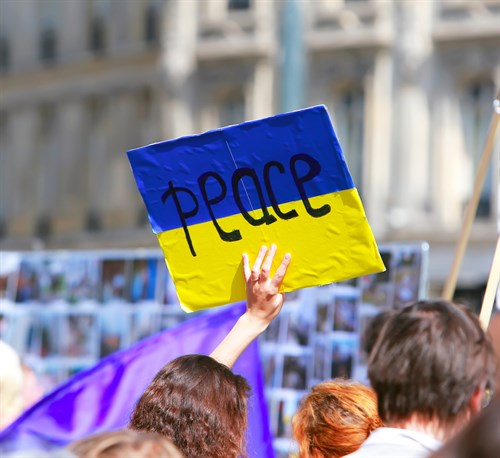In September 2023, the Asser Institute hosted a panel of experts to examine the legal case for prosecuting the crime of aggression against Ukraine. Now, at a critical moment, we return to take stock.
Russia’s full-scale invasion of Ukraine has triggered investigations and prosecutions of conflict-related crimes through a variety of national and international legal avenues. While mechanisms exist to address war crimes, crimes against humanity, and genocide, none are currently equipped to hold military and political leaders accountable for the overarching crime of breaching peace and invading Ukraine’s territory: the crime of aggression.
Given the jurisdictional barriers faced by both the International Criminal Court (ICC) and national courts, international discussions have focused on the possible creation of a dedicated tribunal. Since January 2023, an informal Core Group on the Special Tribunal for the Crime of Aggression against Ukraine has been meeting to develop a viable legal response. This work culminated in a proposal for the Council of Europe to host a Special Tribunal—a bespoke international mechanism specifically designed to prosecute the crime of aggression.After much consideration, on 9 May 2025, the Council of Europe, the European Commission, and the representatives of an international coalition of states formally endorsed the establishment of a Special Tribunal for the Crime of Aggression against Ukraine.
Meanwhile, the ICC’s limited jurisdiction over the crime of aggression has renewed calls to amend the Rome Statute and the Kampala Amendments, aiming to harmonise the jurisdictional regime for aggression with that of the other core international crimes. These proposals will be discussed at a special session of the ICC Assembly of States Parties in New York in July 2025.
Together, these developments reflect a growing international consensus that impunity for what has been called the “original crime”—the unlawful use of force that enabled further atrocity crimes—is unacceptable. They also raise complex legal and institutional questions: the applicability of personal immunities, the relationship with existing international mechanisms, and the ability of any new body to deliver credible and independent justice. This panel will offer legal analysis on:
-
The long-term significance of aligning the Rome Statute’s aggression provisions with those governing genocide, crimes against humanity, and war crimes;
-
The Council of Europe’s model for the Special Tribunal and its legal foundations;
-
Contextual challenges, including the risk of impunity amid potential peace negotiations;
-
The implications of current geopolitical developments, including shifts in the positions of key states;
-
The role of the International Centre for the Prosecution of the Crime of Aggression against Ukraine (ICPA) in case preparation.
Speakers:
-
Andriy Kostin, ambassador of Ukraine to the Netherlands
-
Dr Kateryna Busol, associate professor at the National University of Kyiv-Mohyla Academy, and fellow at the British Institute of International and Comparative Law. [online]
-
Prof. Dr Frank Hoffmeister, head of the legal department at European External Action Services (EEAS) and Professor at the Brussels School of Governance.
-
Dr Anton Korynevych, ambassador-at-large at the Ministry of Foreign Affairs of Ukraine [online].
-
Myroslava Krasnoborova, liaison prosecutor for Ukraine at Eurojust.
-
Prof. Dr Karolina Wierczyńska, associate professor, department of public international law, head of The Center for Research on International Criminal Law at the Polish Academy of Sciences.
Moderator: Dr Gabrielė Chlevickaitė, researcher, Asser Institute
This lecture is co-organised with the IHCL platform.
About the Benjamin Ferencz Lecture Series
The Benjamin Ferencz Lecture Series on International Criminal Justice, previously known as the Supranational Criminal Law (SCL) Lectures Series, has been organised by the T.M.C. Asser Instituut since 2003, in cooperation with the Grotius Centre for International Legal Studies of Leiden University (Campus The Hague) and the Coalition for the International Criminal Court. The lectures are public and free of charge. Read more.
